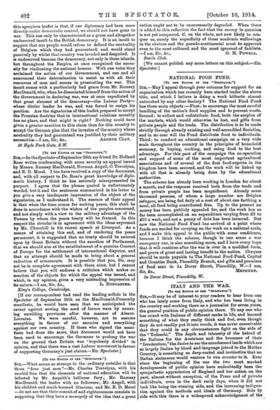[To THE EDITOR 07 THE " spEcTeron."1
theSpecfatorof September 26th my friend Dr. Holland Rose writes condemning with some severity an appeal issued by Messrs. Ramsay MacDonald, Norman Angell, C. Trevelyan, and E. D. Morel. I too have received a copy of the document, and, with all respect to Dr. Rose's great knowledge of diplo- matic history, I think he has seriously misrepresented its purport. I agree that the phrase quoted is unfortunately worded, but it and the sentences summarized in his letter to you give a very inadequate impression of the object of the signatories, as I understand it. The essence of their appeal is that when the time comes for making peace, this shall be done in accordance with the wishes of the peoples concerned, and not simply with a view to the military advantage of the Powers by whom the peace treaty will be framed. In this respect the circular is in agreement with the ideas expressed by Mr. Churchill in his recent speech at Liverpool. As a means of attaining this end, and of rendering the peace permanent, it is suggested that no treaty should be entered upon by Great Britain without the sanction of Parliament, that we should aim at the establishment of a genuine Concert of Europe for the settlement of international disputes, and that an attempt should be made to bring about a general reduction of armaments. It is possible that you, Sir, may not be in complete agreement with these aims, but I cannot believe that you will endorse a criticism which makes no mention of the objects for which the appeal was issued, and which, in my opinion, gives a very misleading impression of [If our correspondent had read the leading article in the Spectator of September 26th on the MacDonald-Ponsonby manifesto, he would have seen that we anticipated the caveat against sowing the seed of future wars by annex- ing unwilling provinces after the manner of Alsace- Lorraine. We were careful, however, not to assume everything in favour of our enemies and everything against our own country. If those who signed the mani- festo had done the same, that document would not have been used to encourage the Germans to prolong the war on the ground that Britain was hopelessly divided' in opinion, and that there was a vast Labour movement in favour of supporting Germany's just clairns.—En. Spectator.]


































 Previous page
Previous page